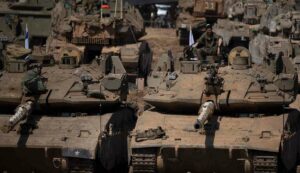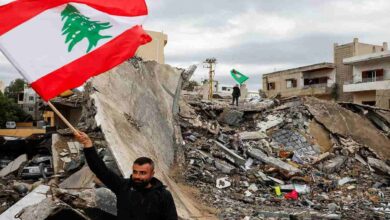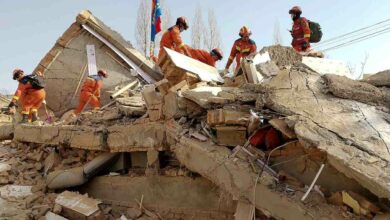Israel army launches ground attack on Hezbollah targets in southern Lebanon
Lebanon: The Israeli military said on Tuesday, October 1, that it had begun “limited, localized, and targeted raids” in the Southern Lebanon border region targeting sites affiliated with Hezbollah.
The Israel Defense Forces (IDF) stated in a statement that the targets, which are in villages near the border, “pose an immediate threat to Israeli communities in northern Israel.”

“Israeli air force and IDF artillery are supporting ground forces with precise strikes on military targets in the area,” the army said.
The statement stated, “The IDF is continuing to operate to achieve the war’s objectives and is doing everything necessary to defend Israel’s citizens and help the people of northern Israel return to their homes.”
In accordance with the decision of the political echelon, a few hours ago, the IDF began limited, localized, and targeted ground raids based on precise intelligence against Hezbollah terrorist targets and infrastructure in southern Lebanon. These targets are located in villages…
— Israel Defense Forces (@IDF) September 30, 2024
The military said that the operation would go on in accordance with the scenario assessment and in tandem with fighting in Gaza and other regions.
In a first broadcast speech after the passing of his leader Hassan Nasrallah, Naim Qassem, the deputy commander of Hezbollah, had said that his forces were “ready if Israel decides to enter by land.”.
After the Israeli army announced the ground operations, the organization did not immediately respond; nonetheless, the Israeli statement announcing the raids was broadcast on the group’s Telegram channel via al-Manar television.
Hezbollah’s military might dwarfs Lebanon’s national army, which is “repositioning” forces away from the border, a military official told AFP.
Prior to this, the US claimed that Israeli soldiers had made a few small ground incursions into Lebanon.
Israeli authorities “have informed us that they are currently conducting… limited operations targeting Hezbollah infrastructure near the border,” US State Department spokesman Matthew Miller told reporters.
Late on Monday, US Defense Secretary Lloyd Austin endorsed Israel’s “dismantling attack infrastructure along the border” on behalf of Washington.
Additionally, he threatened Iran on social media X with “serious consequences” if it attacked Israel directly.
The Israeli military called residents in three southern Beirut areas on Monday night, requesting them to leave.
Israeli military spokeswoman Avichay Adraee said, “You are located near interests and facilities belonging to the terrorist Hezbollah group.”
“For your safety and the safety of your family members, you must evacuate the buildings immediately and stay away from them.”
Following the calls, residents in south Beirut reportedly experienced at least six attacks from Israel, according to a Lebanese security officer.
The village of Aita al-Shaab, which borders Lebanon, was hit hard by shelling, and nearby residents heard helicopters and drones flying above.
According to two Palestinian security sources, Mounir Maqdah, the leader of the military arm of the Palestinian Fatah movement’s branch in Lebanon, was the target of an Israeli attack that occurred early on Tuesday.
According to the reports, the attack struck a building in the packed Ain al-Hilweh Palestinian refugee camp, which is located close to the southern city of Sidon.
We don’t know what happened to Maqdah.
According to a statement released early on Tuesday by Lebanon’s health ministry, Israeli attacks on the country’s southern areas, the eastern Bekaa Valley, and Beirut have resulted in at least 95 deaths and 172 injuries over the course of the last 24 hours.
Israel had already threatened to battle Hezbollah and blocked off a portion of the border after executing the group’s head, who was supported by Iran, despite demands from across the world for a de-escalation.
Israeli Defense Minister Yoav Gallant delivered a seismic blow to the organization on Friday by killing Nasrallah in a huge attack on Beirut, but he also cautioned that the conflict was far from finished.
He said, “We will use all the means that may be required… from the air, from the sea, and on land” to bring about peace.
According to the minister of defense, the death of Nasrallah “is an important step, but it is not the final one”.
After almost a year of border conflict, Gallant informed local council chiefs in northern Israel on Monday that the goal of returning home Israelis who have escaped Hezbollah missiles will be supported in the next phase of the battle along Lebanon’s southern border.
“EVERYONE IS AFRAID.”
One day after its Palestinian affiliate Hamas launched an unprecedented assault on Israel on October 7 that resulted in a conflict in the Gaza Strip, Hezbollah started low-intensity attacks against Israeli forces.
People all throughout the area are afraid that there may be even more bloodshed because of how quickly this month’s border conflicts have intensified.
Israel said earlier this month that it was going to start concentrating on protecting its northern border instead of Gaza.
A portion of the border strip was designated as a “closed military zone” by the army on Monday.
Lebanese authorities claim that throughout the previous week, Israel’s bombings on Lebanon have resulted in hundreds of deaths and driven up to a million people away from their homes.
During the same time period, Hezbollah and other organizations fired missiles, drones, and rockets against Israel; they caused minor injuries but no fatalities.
The arch-enemy of Israel, Iran, is said by Israeli Prime Minister Benjamin Netanyahu to be supporting Hamas, Hezbollah, and other armed organizations and to be driving “our region deeper… into war.”.
Netanyahu issued a warning, saying, “Israel can reach anywhere in the Middle East.”
Although Tehran has said that Israel would be “destruction” as a result of Nasrallah’s death, the foreign ministry stated on Monday that Tehran will not send any combatants to battle Israel.
Najib Mikati, the prime minister of Lebanon, demanded “an end to the Israeli aggression against Lebanon” and asked for a ceasefire based on a recent US-French agreement.
Hezbollah bases in eastern and southern Lebanon, as well as the southern suburbs of Beirut, the organization’s principal stronghold, have been the focus of the majority of Israel’s attacks.
According to Hamas, a hit on the Al-Bass refugee camp in south Lebanon claimed the lives of Fatah Sharif Abu al-Amine, the organization’s commander in Lebanon, together with his wife and two children. The Israeli military declared Sharif dead.
Following an Israeli attack on a building in downtown Beirut on Monday, three members of an armed Palestinian organization claimed to have died.
Panic ensued as a result of the strike, the first in the city center in years.
Kahier Bannout, 42, a resident of Central Beirut, said that the neighborhood was “supposed to be a safe area—not a war zone.”.





